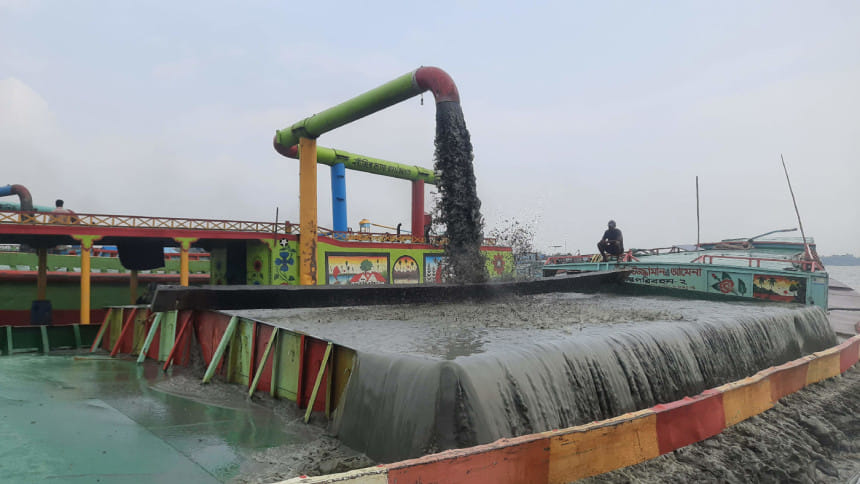
Defying the law, locally influential people are illegally extracting sand from many sites of different rivers and seashores across the country, affecting biodiversity and upsetting ecosystems in the country’s waters.
This has recently been revealed in a new study conducted by River and Delta Research Centre (RDRC), an organisation that researches different aspects of water resources.
Currently, there are 707 government-announced sand extracting sites, known as “Balumahal”, of which 382 have been leased out to different individuals.
Titled “Mapping the sand extraction scenario in Bangladesh 2023”, the study, however, shows that at least 265 people are illegally extracting sand from 132 unauthorised sites of 77 rivers. It says at least 54 out of the 265 individuals are local public representatives.
According to the study, the Padma, the Jamuna, the Meghna, the Brahmaputra, and the Surma are the hotspots of sand extraction.
Of the 132 illegal sites, 20 are in the Padma, 13 in the Jamuna, 12 in the Meghna, six in the Brahmaputra, five in the Surma and the Piyain, four in the Teesta, three in the Sangu, and three in the Ichhamati. The rest are located in other rivers across the country.
The study also says there are at least seven sites in the Bay of Bengal where illegal sand extraction is being carried out.
Explaining how unplanned sand extraction impacts the ecological balance, RDRC chairman Mohammad Azaz said, “As Bangladesh is a riverine country, it largely depends on rivers and their resources, especially water and the fishes. Sand extraction impacts the geo-natural environment of the river, which disturbs the ecology of the rivers.”
Citing documents of the land ministry from 2017-19, the report says the number of Balumahal was 733 in 2016 while it was reduced to 707 in the fiscal 2017-18.
In the fiscal 2018-19, 382 — more than half the total number — were leased out for dredging and extracting sand.
The government regulates sand extraction activities with a 2010 law, which was amended in the last parliament session and renamed as “Bangladesh Balumahal and Soil Management Act, 2023”.
According to the amended law, extraction of sand and soil from rivers is illegal if it is carried out for commercial purpose and if the dredging leads to erosion; if it harms a river’s natural environment, biodiversity, fishes, and ecosystem, or if it harms arable land or the flora and fauna in any area.
As per the law, sand extraction from any unauthorized site, or Balumahal, is a punishable offence.
Commenting on how sand should be extracted from rivers, Syeda Rizwana Hasan, chief executive of Bangladesh Environmental Lawyers Association (BELA), said there are only two purposes of sand extraction from rivers — supplying sand as construction materials and river training.
“There is no scope of extracting sand in an unplanned and unscientific way. There should be a hydrographic survey before dredging a river. But that’s not how it happens.”
Rizwana also said it is necessary that the administration watches the sand extraction sites and that the highway police also check vehicles carrying sand.
Sharif Jamil, the Bangladesh representative of International Riverkeeper, said the actual picture of illegal sand extraction is far grimmer than what the study suggests.
The government rewards the lease of sand extraction sites to people considering their political affiliation, he alleged.
“That’s why those who are rewarded the lease extract more sand than what they are supposed to. Even the government agencies are dredging rivers without conducting any hydrographic survey,” he said.
We can’t save our rivers if such practices are not stopped, he warned
